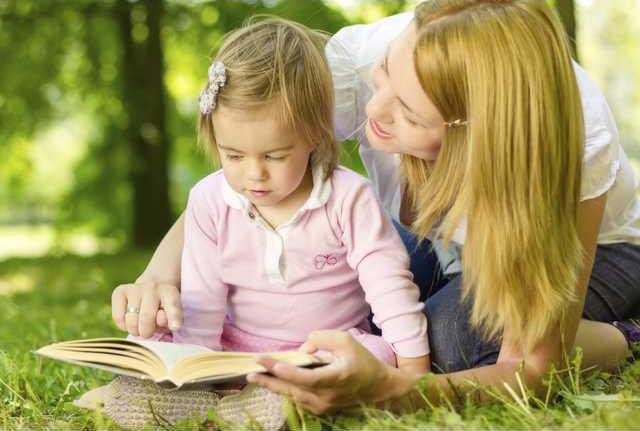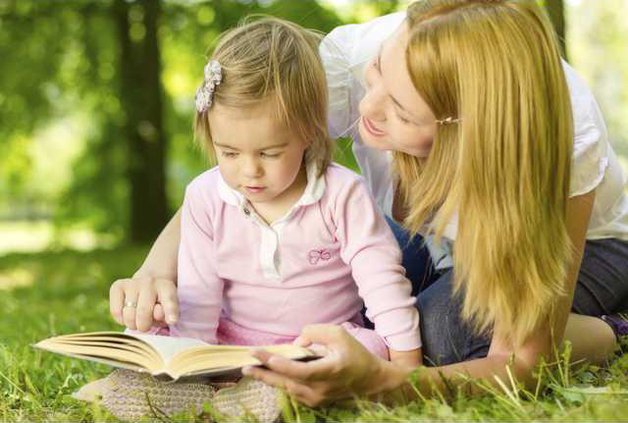Its hard to get children of any age to slow down long enough to read a book, but making the effort to read with them has added benefits.
A new study suggests that reading with children as young as 3 and 5 years old can change their brain development.
The study used functional magnetic resonance imaging to look at the brain activity of children who were listening to prerecorded stories, Carina Storrs reported for CNN.
The results show the areas of the brain in control of memory and understanding words and concepts were much more active. However, children who had parents who read to them saw higher levels of activity than the other children.
"The more you read to your child the more you help the neurons in this region to grow and connect in a way that will benefit the child in the future in reading," Tzipi Horowitz-Kraus, program director of the Reading and Literacy Discovery Center at Cincinnati Children's Hospital, said.
According to PBS, one in three children will start kindergarten without the necessary skills to learn to read, and two in three children will leave third grade without being able to read proficiently.
Children with very poor reading proficiency by the time they enter the fourth grade are the ones at greatest risk to not graduate from high school and then not be able to be successful successful in their own life course, economically, for example, Pamela High told PBS Jeffrey Brown.
Parents can start introducing their children to books at a young age, even if they are just patting pictures, High said. As children get older, they can start recognizing letters and then words, but they must be exposed to reading and books at a young age.
Reading with kids can have lifelong effects. For example, it builds a better vocabulary, helps them stay afloat in school, and builds communication skills and self-confidence, according to The Huffington Post.
"With more knowledge comes more confidence. More confidence builds self-esteem. So its a chain reaction. Since you are so well-read, people look to you for answers. Your feelings about yourself can only get better," education provider Gemm Learning said.
Reading together can also bond a parent and child together more deeply than other activities because it requires both to slow down, sit together and think, Storrs reported.
"It's one of the most pleasurable activities that you do with your child there's physical closeness but it's probably the most unhurried time that children have with their parent, and it is focused on them," Barry Zuckerman, professor of pediatrics at Boston University School of Medicine, said.
A new study suggests that reading with children as young as 3 and 5 years old can change their brain development.
The study used functional magnetic resonance imaging to look at the brain activity of children who were listening to prerecorded stories, Carina Storrs reported for CNN.
The results show the areas of the brain in control of memory and understanding words and concepts were much more active. However, children who had parents who read to them saw higher levels of activity than the other children.
"The more you read to your child the more you help the neurons in this region to grow and connect in a way that will benefit the child in the future in reading," Tzipi Horowitz-Kraus, program director of the Reading and Literacy Discovery Center at Cincinnati Children's Hospital, said.
According to PBS, one in three children will start kindergarten without the necessary skills to learn to read, and two in three children will leave third grade without being able to read proficiently.
Children with very poor reading proficiency by the time they enter the fourth grade are the ones at greatest risk to not graduate from high school and then not be able to be successful successful in their own life course, economically, for example, Pamela High told PBS Jeffrey Brown.
Parents can start introducing their children to books at a young age, even if they are just patting pictures, High said. As children get older, they can start recognizing letters and then words, but they must be exposed to reading and books at a young age.
Reading with kids can have lifelong effects. For example, it builds a better vocabulary, helps them stay afloat in school, and builds communication skills and self-confidence, according to The Huffington Post.
"With more knowledge comes more confidence. More confidence builds self-esteem. So its a chain reaction. Since you are so well-read, people look to you for answers. Your feelings about yourself can only get better," education provider Gemm Learning said.
Reading together can also bond a parent and child together more deeply than other activities because it requires both to slow down, sit together and think, Storrs reported.
"It's one of the most pleasurable activities that you do with your child there's physical closeness but it's probably the most unhurried time that children have with their parent, and it is focused on them," Barry Zuckerman, professor of pediatrics at Boston University School of Medicine, said.





